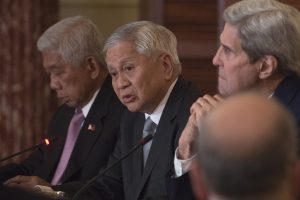Former Philippine Foreign Secretary Albert del Rosario, who successfully led the country in its international arbitration case over its dispute with China in the South China Sea and emerged as a vocal critic of President Rodrigo Duterte, died yesterday. He was 83.
His death was confirmed in a statement from his daughter Dr. Inge del Rosario that was sent to major media outlets.
“The family of Ambassador Albert Ferreros del Rosario is deeply saddened to announce his passing today, April 18, 2023. He was 83. The family requests privacy during this difficult time,” she said in the statement.
In a post on Twitter, Enrique Manalo, the current foreign secretary, described Del Rosario as “a consummate diplomat and an inspiring leader” who led the Department of Foreign Affairs “with integrity and unwavering commitment to public service.”
He added, “You will be missed, Mr. Secretary.”
Born in Manila in 1939, Del Rosario served as the Philippine Ambassador to the United States from 2001 to 2006 before his appointment to the foreign secretary’s post under the administration of President Benigno Aquino III, who was in office from 2011 until 2016. (He stepped down in the later part of Aquino’s term for health reasons.)
It was during this period that Rosario emerged a hawkish opponent of China’s assertive actions to advance and defend its controversial “nine-dash line” maritime claim in the South China Sea. In particular, he spearheaded the case that the Philippines filed against China at an international arbitral tribunal in The Hague in 2013, challenging the legality of Beijing’s claims.
Three years later, the tribunal ruled that China’s claim of historic rights to resources within the sea areas falling within the “nine-dash line” had no basis in law. It also upheld the Philippines’ sovereign rights and jurisdiction within its 200-nautical-mile exclusive economic zone, which is bisected off by China’s “nine-dash line.”
This necessarily also made Rosario a leading critic of President Rodrigo Duterte, who came to office shortly after the ruling was handed down. Driven by a complex and evanescent mix of personal and political grudges, Duterte snubbed the U.S. and steered the Philippines into a closer partnership with China. In doing so, Duterte set aside the arbitral award, which he once likened it to a mere piece of “paper,” and said that he would prefer to talk directly with China about the outstanding disputes in the South China Sea.
Rosario was scathingly critical of Duterte’s vacillating reaction to the continuing Chinese incursions into the Philippines’ EEZ. On the second anniversary of the ruling, he expressed his dismay that the Philippines had become, in his words, a “willing victim” and an “abettor” of China. In response, Duterte on one occasion accused him of “treason” and threatened to throw coffee in his face.
Shortly before last May’s presidential election, which marked the end of Duterte’s six-year term in office, he said that confronting China over its unlawful maritime activity was “an intergenerational struggle” for the Philippines. “We should elect a government that would strongly fight for what is ours and for all nations to uphold the rule of law,” he said.
He would likely have been happy with the position that President Ferdinand Marcos Jr. has taken since his inauguration last July. Shortly after his landslide election in May, Marcos pledged to uphold the 2016 arbitral ruling and said that as president he would not allow “a single millimeter of our maritime coastal rights to be trampled upon.” Rosario said that he was “deeply thankful” for the president-elect’s remarks.
In the first days of his administration, Manalo described the arbitral award as “final.”
“We firmly reject attempts to undermine it; nay, even erase it from law, history, and our collective memories,” he said. “At the same time, we welcome the support of a growing list of countries for the Award.”
The months since have seen a rapid advance in the U.S.-Philippines security relationship, driven by overlapping concerns about China’s growing power and ambition. The two nations have expanded the remit of the 2014 Enhanced Defense Cooperation Agreement, which fell into abeyance under Duterte, and have pledged to restart joint maritime patrols. The Marcos administration has also been calling out publicly and vocally China’s regular incursions into the Philippines’ EEZ.
The Stratbase ADR Institute, the think-tank of which del Rosario served as chairperson, praised him for fighting “for an independent foreign policy that prioritizes the interests of the country and of the Filipino people,” according to a report by BenarNews.
The institute added, “He believed that diplomacy is a great equalizer in international affairs and that each state had an equal voice in the global community regardless of their political, economic, or military capabilities.”

































